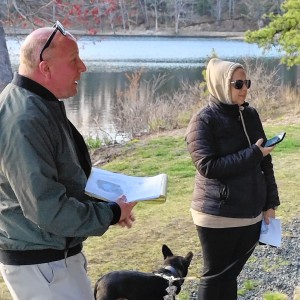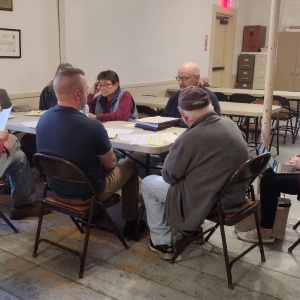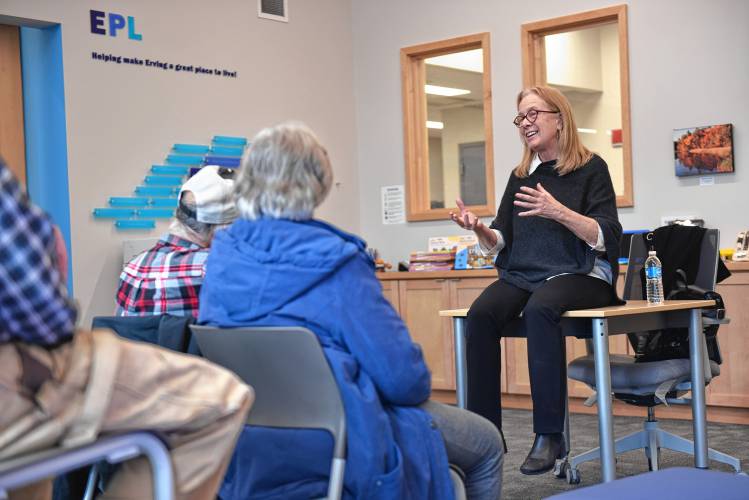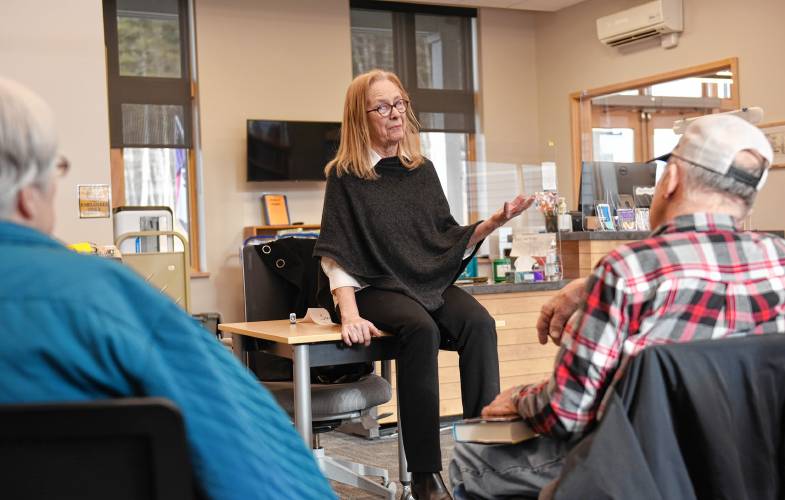Judge speaks on prevalent crimes, rehabilitative programs for former inmates
| Published: 03-21-2024 5:08 PM |
ERVING — With 15 years of experience on the bench at Orange District Court, Judge Laurie MacLeod shared some of the significant problems facing Franklin County and the promising programs that aim to remedy them.
MacLeod met with Franklin County residents at the Erving Public Library on Tuesday evening for a question-and-answer style meeting, in which she spoke about her role as a judge, some of the prevalent crimes she sees frequently in the county and the court’s rehabilitative programs to help re-integrate parolees into society.
“There is an underbelly of our life here in Franklin County where there are people who are committing crimes, and for which the court system, to the extent that we can, tries to help,” MacLeod said. “The people who I see are people who have fallen on hard times in their lives. They might not have had the best upbringing, they might be lacking in social skills or lacking in life skills, dealing with substance disorder, don’t know what to do or where to go, and resort to crimes of either property or personal violence.”
MacLeod was first appointed by former Gov. Deval Patrick in 2009. Beginning her career as an attorney after she graduated from Benjamin N. Cardozo School of Law, she went on to work as an assistant district attorney and later for a private practice. Now, she said she spends Wednesdays in Holyoke presiding over the Veterans Treatment Court, a now nine-year-old court for veterans who have been charged with crimes that often stem from substance abuse issues or post-traumatic stress disorder.
Veterans Treatment Court, which MacLeod said has lead to success stories for more than 70 veterans, prioritizes sentences to probation for roughly 18 to 24 months with therapy and treatment, rather than incarceration.
“Oftentimes, it’s veterans who have either mental health disorders or substance use disorders, and sometimes those disorders were brought on by their military service, or certainly not improved by their military service. … As you can imagine, it’s a horror for a veteran with PTSD to be in jail,” MacLeod said. “We’re trying to get people back on their feet.”
During and since the COVID-19 pandemic, MacLeod said she has noticed an increasing number of domestic violence cases. MacLeod said the Greenfield District Women’s Program provides services for women who have faced domestic violence, including self-defense courses or art and financial literacy classes.
Additionally, MacLeod said she’s involved with numerous rehabilitative programs, such as Changing Lives Through Literature, in which a judge, probation officer and a librarian meet to read literature with parolees. She said the process helps those who were once incarcerated bond with their parole officers and judges, while also engaging them in reading.
Article continues after...
Yesterday's Most Read Articles
 Carol Doucette of Royalston receives $15,000 from Publishers Clearing House
Carol Doucette of Royalston receives $15,000 from Publishers Clearing House
 Magic comes to Red Apple in Phillipston
Magic comes to Red Apple in Phillipston
 Plan calls for upgrades to Silver Lake in Athol
Plan calls for upgrades to Silver Lake in Athol
 Royalston’s FinCom debates proposed salary increases
Royalston’s FinCom debates proposed salary increases
 Locking up carbon for good: Easthampton inventor’s CO2 removal system turns biomass into biochar
Locking up carbon for good: Easthampton inventor’s CO2 removal system turns biomass into biochar
 Liberty Taphouse to open in Athol
Liberty Taphouse to open in Athol
“Some of the things that I hear on a daily basis just make your blood boil,” MacLeod said. “It’s important that in these programs that we’re doing, we can reach out and do some transformational work.”
In the future, MacLeod said she hopes to see an expansion of more preventative educational and therapeutic services in the community for those who have not yet entered the criminal justice system. By integrating social programs into community centers, schools and other public programs, MacLeod said the criminal justice system can break generational cycles of violence.
“There’s robust literature to suggest that boys who grow up in households where their fathers abuse their mothers often learn that that’s OK, and they repeat the behavior,” MacLeod said. “There’s also robust literature to support that the girls who grow up in those households learn that it’s OK to be a victim of domestic violence, ad the cycle just repeats itself. There’s a way to break that cycle of violence by education, community and the work of social workers.”
Although it’s far from an easy job, MacLeod said she is grateful for the fact that she works in Massachusetts, where she said the laws are “more reasonable” than they are in other states.
“We’re lucky to live in this area where I think that the judicial system and the courts try to serve the people in the communities, and try to prevent crime and work toward rehabilitating people who have committed crimes,” MacLeod said. “I’m grateful that I’m able to dispense justice, be fair to people and give everybody a fair shake when they come to my court.”
Anthony Cammalleri can be reached at acammalleri@recorder.com or 413-930-4429.



 Over $400M in shelter funding, new limits approved
Over $400M in shelter funding, new limits approved PHOTO: Spectacular spire
PHOTO: Spectacular spire